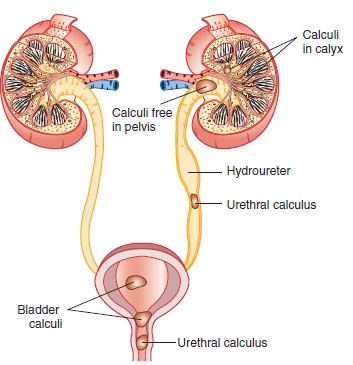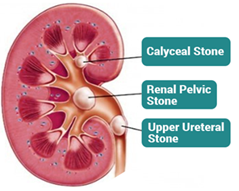Renal calculi is the medical term used to describe kidney stones, which are small, hard deposits that form in the urine that are made up of mineral and acid salts. Though kidney stones form in the kidneys, they can be transported throughout the urinary tract, which includes the kidneys, ureters, bladder, and urethra. Kidney stones are most commonly found in people between the ages of 20-40, and about one million people are treated for them every year. They are problematic because they can block urine from leaving the body, causing kidney infections and damage.They cause a lot of pain as they move around the body.

Types and Causes of Renal Calculi
Kidney stones form when there are more solid waste particles filtered by the kidneys than there is urine to dissolve them. When these wastes cannot dissolve, they stay in a solid form and are called kidney stones. Different types of kidney stones form based on the type of waste particle present.
Common type of these stones are made of calcium. Calcium is the most copious mineral that is found in the body. Specifically, kidney stones are made of calcium oxalate, phosphate, or maleate. The amount of calcium consumed in food doesn’t affect the formation of kidney stones, but the amount of oxalate (natural substance found in some food items) in the diet does. Spinach, beets, nuts, and potato chips are all foods high in oxalate, which can increase the development of kidney stones.
Kidney stones can also be made of uric acid, and these are most commonly found in men and in people with conditions like gout or who are undergoing chemotherapy. Uric acid is produced when the body breaks down purines, which are substances found in certain foods. These usually form when someone isn’t getting enough fluids or they are losing too much fluid.
Kidney stones made of struvite form due to an infection, most commonly a urinary tract infection. Struvite is a substance composed of magnesium, ammonium, and phosphate. Women are more at risk of this type than men.
A rare form of kidney stone made of cysteine occurs in people with the genetic disorder cystinuria, where their kidneys excrete too much of certain amino acids. Other types of stones can form as a side effect of certain medications.

Symptoms of Renal Calculi
The severe pain that kidney stones can cause is bad enough that it has its own name: renal colic. The pain is usually in the lower back or sides, below the rib cage, and it may come in waves and vary in intensity.
Other symptoms include restlessness, blood in the urine, nausea, vomiting, discolored urine, bad-smelling urine, chills, fever, difficulty urinating, or frequently feeling the urge to urinate but only producing a small amount.
Treatment
-Lithotripsy
-Tunnel surgery (percutaneous nephrolithotomy)
-Ureteroscopy